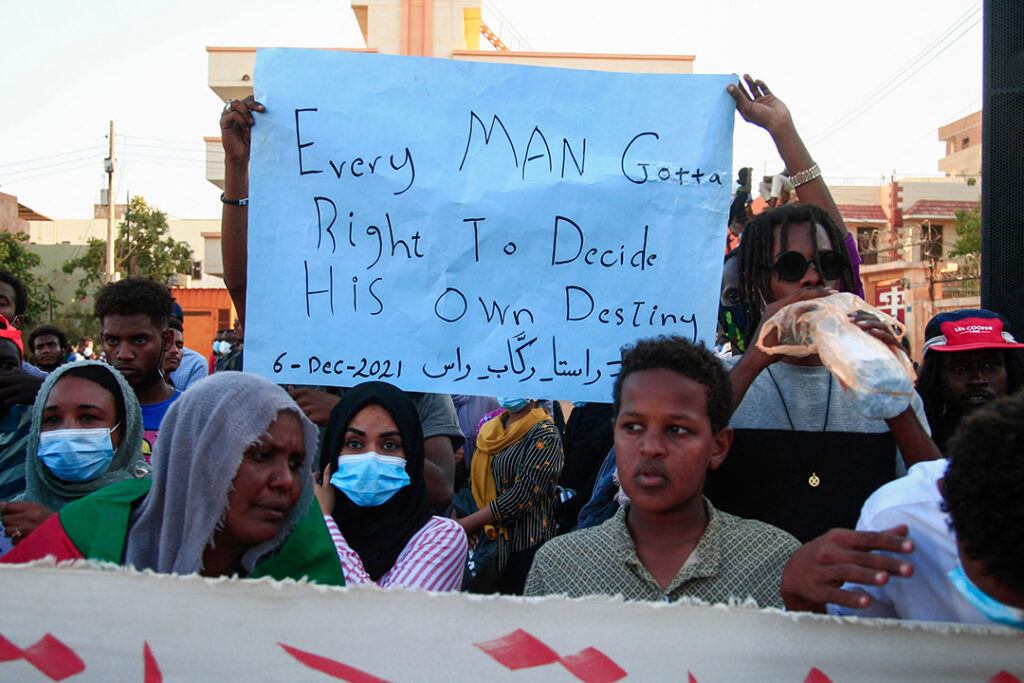ADF STAFF
Members of Sudan’s protest movement are denouncing a revised power-sharing agreement recently signed by the country’s military and civilian leadership. Many had hoped the deal would put the country on a path to democracy, but now fear it will allow the military to maintain its grip on power.
The new agreement was signed in late November by Prime Minister Abdalla Hamdok and Gen. Abdel Fattah al-Burhan about a month after al-Burhan led a military coup that arrested Hamdok and the civilian members of Sudan’s Sovereignty Council.
The 14-point deal creates a new Sovereignty Council and returned Hamdok to his position, but in what some see as a politically weakened state. The plan supports the Juba Peace Agreement, releases political prisoners and forms a legislative council. It also calls for reforming the Dismantling Committee, which was tasked with reclaiming land and natural resources illegally acquired by former dictator Omar al-Bashir and his cronies.
During the signing ceremony, Hamdok said he supported the agreement as a way to avoid pushing Sudan deeper into political strife.
“We can all prevent our country from plunging into the unknown,” he said.
One thing not included in the agreement: a date for transitioning to civilian rule. Analysts suggest that could allow the military to remain in power indefinitely.
The lack of a schedule for a transition to full civilian rule has added fuel to Sudan’s widespread protests against the military.
“The street’s core demand was not the release of Hamdok, but the removal of the military from politics,” Kholood Khair, managing partner of Khartoum-based Insight Strategy Partners think tank, wrote on Twitter.
Khair described the revised agreement as “whitewashing” the coup to reduce international pressure on al-Burhan and his supporters.
The new deal does not include a role for the Forces for Freedom and Change (FFC), the coalition that backed Hamdok. By eliminating the FFC from its revised agreement, al-Burhan’s forces effectively have isolated Hamdok and made him dependent on the military for political survival, Khair said.
“Without [a] buffer between PM + military, he faces more, not less military pressure,” she wrote on Twitter.
Al-Burhan chaired the joint military-civilian Sovereignty Council set up to run the country after the overthrow of al-Bashir in 2019.
Under the agreement that created the Sovereignty Council, the military, which led the council for half of the 18-month transition period, was scheduled to turn over leadership to the civilian members in mid-November. Al-Burhan’s Oct. 25 coup scuttled those plans.
Before the coup, civilian members of the Sovereignty Council had begun investigating abuses by the military’s Rapid Support Forces and had started taxing some of the military’s business interests. Sudan’s military is deeply embedded in the national economy.
Jok Madut Jok, a professor at Syracuse University and expert on Sudanese governance, noted that al-Burhan’s new terms largely reflect the original agreement, including the statement that the transitional period will end with elections.
“Those were the same rules that were in place in 2019,” Jok told South Africa’s SABC television. “If the military were simply looking for those, why did they have to overthrow anything?”
Al-Burhan’s revised deal and Hamdok’s support of it have created mistrust between Sudan’s civilian leadership and its military, Jok said.
“That doesn’t bode well for stability going forward,” he added. “This agreement falls way short of what the protesters want.”
Samahir Elmubarak, spokeswoman for the Sudanese Professionals Association, told Al Jazeera the public’s patience with Burhan and the military has run out. The military has failed in its promise to safeguard democracy and the transitional government, she said.
“The only way we can transition to a complete democracy is by washing out the military,” Elmubarak said.
Until that happens, the peaceful protests will continue, she said.
“We will continue the struggle until we realize complete civilian transition,” Elmubarak said. “However long it takes, it’s where we will win in the end.”

